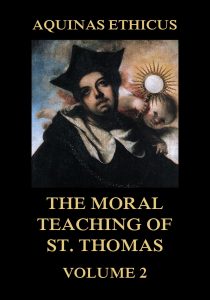Aquinas Ethicus: The Moral Teaching of St. Thomas Vol. 2 – St. Thomas Acquinas
St. Thomas is not only the king of theologians, but the prince of moralists, and it has seemed a pity that his own words on matters of daily practice should have been so long inaccessible to the English reader. Technical Latin is not attractive to those who are unversed in it, and the student of ethics might be easily bewildered by the large admixture of speculative theology in the Summa.
In this translation the separation of ethics from theology has been carried out in the main, and the English has been made as simple as the subject-matter permits. This is volume two out of two and a a translation of the principal portions of the second part of the Summa Theologica including more than four hundred endnotes.
Format: Paperback.
Aquinas Ethicus: The Moral Teaching of St. Thomas Vol. 2.
ISBN: 9783849692988
Available at amazon.com and other venues.
Biography of St. Thomas Aquinas (from wikipedia.com)
Saint Thomas Aquinas O.P. (1225 – 7 March 1274), was an Italian Dominican friar, Catholic priest, and Doctor of the Church. He was an immensely influential philosopher, theologian, and jurist in the tradition of scholasticism, within which he is also known as the Doctor Angelicus and the Doctor Communis. The name Aquinas identifies his ancestral origins in the county of Aquino in present-day Lazio.
He was the foremost classical proponent of natural theology and the father of Thomism; of which he argued that reason is found in God. His influence on Western thought is considerable, and much of modern philosophy developed or opposed his ideas, particularly in the areas of ethics, natural law, metaphysics, and political theory. Unlike many currents in the Church of the time, Thomas embraced several ideas put forward by Aristotle—whom he called “the Philosopher”—and attempted to synthesize Aristotelian philosophy with the principles of Christianity. The works for which he is best known are the Summa Theologiae and the Summa contra Gentiles. His commentaries on Scripture and on Aristotle form an important part of his body of work. Furthermore, Thomas is distinguished for his eucharistic hymns, which form a part of the Church’s liturgy.
The Catholic Church honors Thomas Aquinas as a saint and regards him as the model teacher for those studying for the priesthood, and indeed the highest expression of both natural reason and speculative theology. In modern times, under papal directives, the study of his works was long used as a core of the required program of study for those seeking ordination as priests or deacons, as well as for those in religious formation and for other students of the sacred disciplines (philosophy, Catholic theology, church history, liturgy, and canon law).
Thomas Aquinas is considered one of the Catholic Church’s greatest theologians and philosophers. Pope Benedict XV declared: “This (Dominican) Order … acquired new luster when the Church declared the teaching of Thomas to be her own and that Doctor, honored with the special praises of the Pontiffs, the master and patron of Catholic schools.” The English philosopher Anthony Kenny considers Aquinas to be ‘one of the dozen greatest philosophers of the western world’.
(The text of the last section was taken from a Wikipedia entry and is available under the the Creative Commons Attribution-ShareAlike License.)
Publisher’s Note: This book is printed and distributed by Createspace a DBA of On-Demand Publishing LLC and is typically not available anywhere else than in stores owned and operated by Amazon or Createspace.

